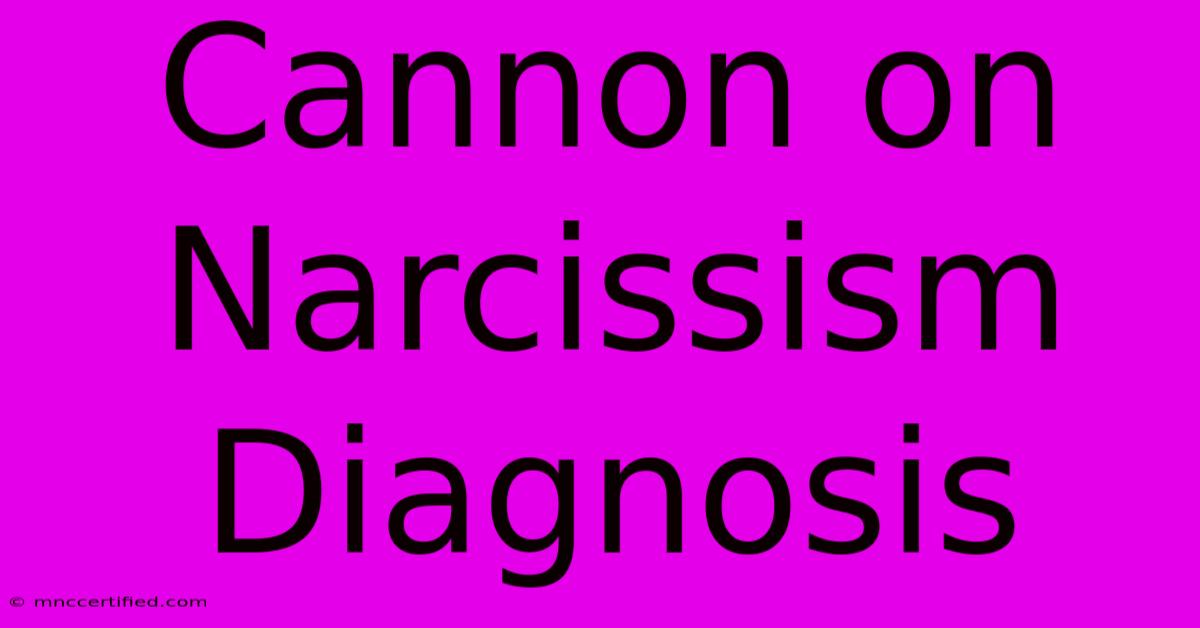Cannon On Narcissism Diagnosis

Table of Contents
Cannon on Narcissism Diagnosis: A Comprehensive Overview
The diagnosis of Narcissistic Personality Disorder (NPD) is a complex process, often fraught with challenges. While the Diagnostic and Statistical Manual of Mental Disorders, 5th Edition (DSM-5) provides criteria, the subjective nature of the disorder and the potential for overlap with other conditions make accurate diagnosis demanding. This article explores the key contributions of Dr. Robert Cannon, a prominent figure in the field of NPD research and diagnosis, highlighting his insights and approaches. We’ll delve into his perspectives on the challenges and nuances involved in identifying this often-misunderstood personality disorder.
Understanding Narcissistic Personality Disorder (NPD)
Before diving into Dr. Cannon's work, it's crucial to understand the core features of NPD as defined by the DSM-5. The diagnosis hinges on a persistent pattern of grandiosity, a need for admiration, and a lack of empathy, typically beginning in early adulthood and manifesting across various contexts. Key symptoms include:
- Grandiose sense of self-importance: Exaggerating achievements and talents; expecting to be recognized as superior without commensurate achievements.
- Preoccupation with fantasies of unlimited success, power, brilliance, beauty, or ideal love: Living in a world of idealized self-perception.
- Belief that they are "special" and unique and can only be understood by, or should associate with, other special or high-status people (or institutions): A sense of entitlement and exclusivity.
- Requires excessive admiration: Demanding constant attention and validation.
- Sense of entitlement: Unreasonable expectations of favorable treatment or automatic compliance with their expectations.
- Interpersonally exploitative: Taking advantage of others to achieve their own ends.
- Lack of empathy: Unwillingness to recognize or identify with the feelings and needs of others.
- Often envious of others or believes that others are envious of him or her: A pervasive sense of competition and superiority.
- Shows arrogant, haughty behaviors or attitudes: A condescending and dismissive approach to others.
Dr. Cannon's Contributions to NPD Diagnosis
While Dr. Cannon hasn't published a singular "Cannon Method" for diagnosing NPD, his extensive research and clinical experience offer valuable insights into the intricacies of diagnosing this complex disorder. His work sheds light on several crucial aspects:
1. The Importance of Differential Diagnosis:
Dr. Cannon emphasizes the critical importance of differentiating NPD from other conditions that share overlapping symptoms. Conditions like histrionic personality disorder, antisocial personality disorder, and even bipolar disorder can present with traits that mimic NPD, leading to misdiagnosis. He highlights the need for a thorough assessment, considering the entire clinical picture and not just isolated symptoms. Careful differential diagnosis is paramount to accurate NPD diagnosis.
2. The Role of Clinical Interviewing:
Dr. Cannon likely stresses the value of a comprehensive clinical interview. This involves not just asking about symptoms but also exploring the patient's history, relationships, and overall functioning. Observing the patient's behavior during the interview itself provides valuable information that can supplement self-reported data. Nonverbal cues and the patient's interaction style can reveal aspects of their personality not easily captured through questionnaires.
3. Considering the Context and Nuances:
NPD is not a static entity; its manifestation varies depending on the individual and their life circumstances. Dr. Cannon’s work likely emphasizes the need to assess the severity and impact of narcissistic traits in different settings and relationships. A seemingly grandiose individual might exhibit more subdued behavior in certain contexts, making a holistic approach crucial.
4. Limitations of Diagnostic Tools:
While standardized questionnaires can be helpful in assessing NPD traits, Dr. Cannon likely acknowledges their limitations. Self-reported data can be biased, and the structured format may not capture the complexity and nuances of individual presentations. He likely advocates for using these tools in conjunction with clinical interviews and other assessment methods.
Challenges in Diagnosing Narcissistic Personality Disorder
The diagnosis of NPD remains challenging due to several factors:
- Subjectivity of Symptoms: Many NPD symptoms are subjective and rely on self-report, which can be unreliable.
- Comorbidity: NPD often co-occurs with other disorders, making accurate diagnosis more difficult.
- Variability in Presentation: NPD manifests differently in individuals, making it hard to establish a uniform diagnostic criteria.
- Lack of Awareness: Individuals with NPD often lack awareness of their own condition, making diagnosis challenging.
Conclusion
Accurately diagnosing Narcissistic Personality Disorder requires a comprehensive and nuanced approach. While Dr. Robert Cannon may not have a single, named diagnostic method, his work underscores the importance of careful differential diagnosis, thorough clinical interviews, consideration of contextual factors, and recognition of the limitations of diagnostic tools. By understanding these complexities and integrating a multifaceted approach, clinicians can strive for a more accurate and insightful diagnosis of NPD. Further research, exploring the contributions of clinicians like Dr. Cannon, is crucial for improving our understanding and diagnosis of this complex disorder.
Keywords: Narcissistic Personality Disorder, NPD, diagnosis, Dr. Robert Cannon, DSM-5, differential diagnosis, clinical interview, comorbidity, psychological assessment, personality disorder, mental health
Off-Page SEO Strategies: Building backlinks to this article from reputable psychology websites, forums, and mental health blogs would significantly enhance its search engine ranking. Sharing the article on relevant social media platforms and engaging with comments and discussions will also increase visibility.

Thank you for visiting our website wich cover about Cannon On Narcissism Diagnosis. We hope the information provided has been useful to you. Feel free to contact us if you have any questions or need further assistance. See you next time and dont miss to bookmark.
Featured Posts
-
Record Set Mahomes To Watson Chiefs Win
Nov 30, 2024
-
Ramsdale Joins Southamptons Var Protest
Nov 30, 2024
-
Husker Max Predicts Nebraska Football Vs Iowa
Nov 30, 2024
-
Affleck Garner Feed Homeless On Thanksgiving
Nov 30, 2024
-
Aevo Crypto Price Prediction
Nov 30, 2024